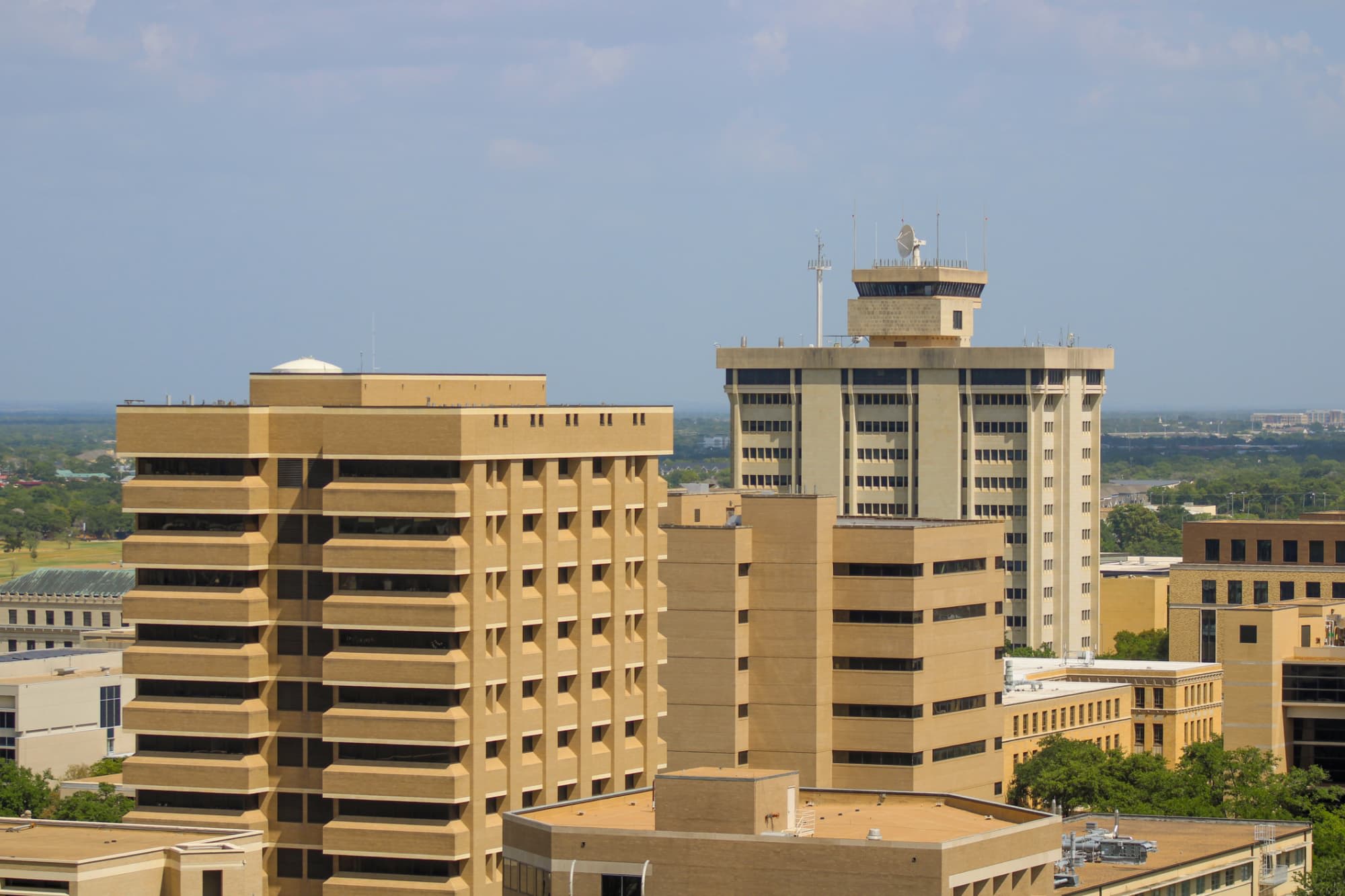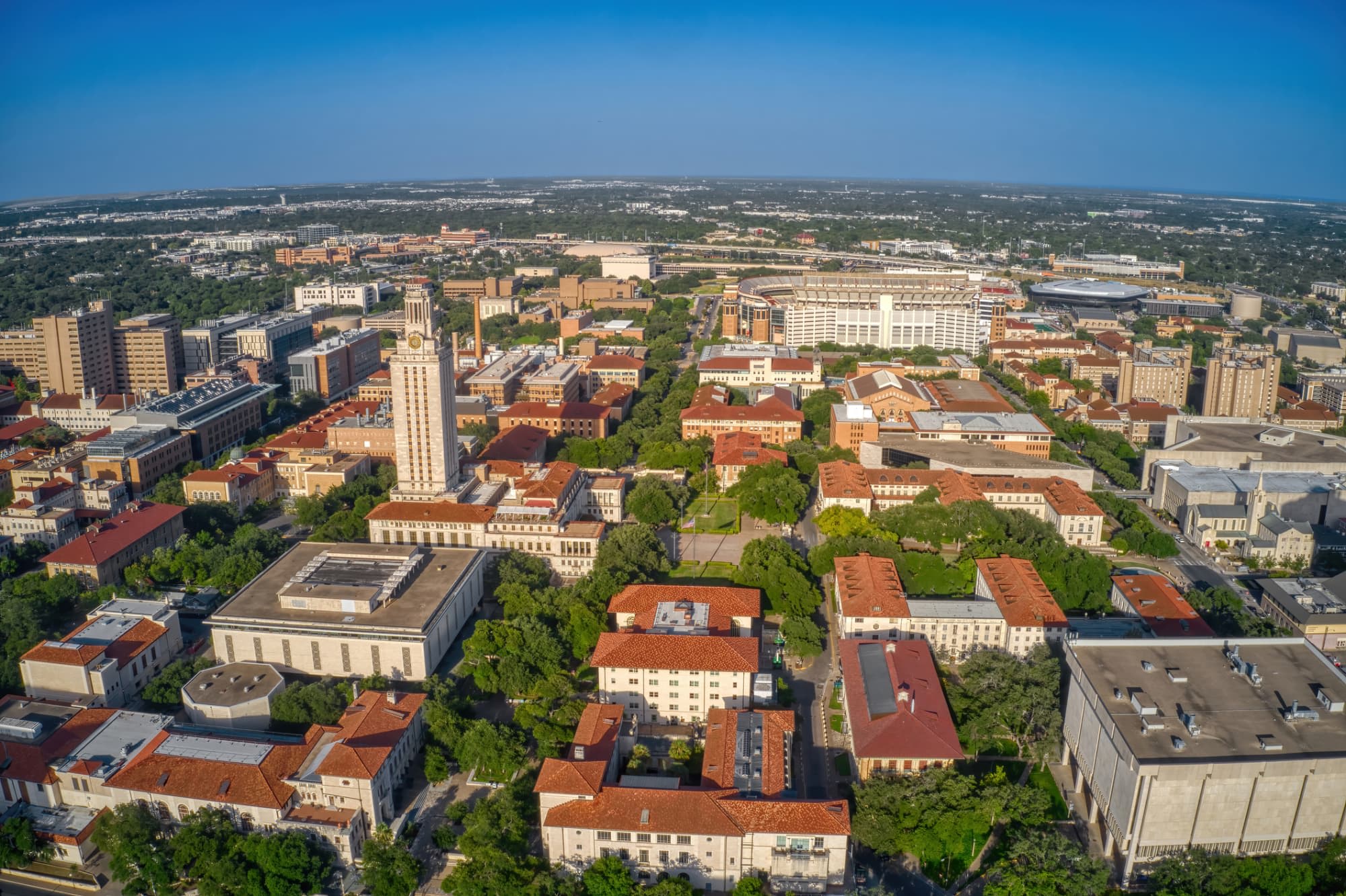MBA Programs in Texas Overview
MBA programs typically cover the core business areas, such as finance, marketing, and accounting. These programs emphasize management, global business practices, and problem-solving skills while also providing you with networking and experiential learning opportunities.
MBA programs have a long history in Texas, with one of the country’s first MBAs starting at the University of Texas at Austin in 1917. In the last 100+ years, the state has introduced some of the nation’s best MBA programs, offering evening, executive, and online MBA program options.
3 Popular Business Schools in Texas
The following three schools represent some of the best MBA programs in Texas. We chose these programs based on their popularity, enrollment numbers, admissions selectiveness, and academic quality.

Rice University
The Jones Graduate School of Business offers MBA programs that work for you — including full- or part-time, on-campus, and online. The classes are small, the training intensive, and the results speak for themselves. In 2022:
- 96% of Rice MBAs accepted job offers within three months of graduation.
- 69% of those offers resulted from school-facilitated activities.
The average starting salary for Rice MBA grads was $142,000. Many Rice MBA students go on to forge new, exciting businesses. All MBA programs take two years to complete.
Tuition and Fees for an MBA from Rice
- Full-Time MBA: $70,500 per year (Note: In 2023, Rice Business provided merit-based scholarships to over 75% of full-time MBAstudents, with an average award covering over 50% of tuition costs.)
- Professional MBA: $61,750
- Executive MBA: $72,500 per year
- Hybrid MBA: $67,500 per year
- Online MBA: $118,476 total
Applying to Rice’s MBA Programs: A Checklist
- Complete an online application form.
- Submit transcripts from each undergraduate and graduate institution in which a degree was earned.
- Submit GMAT/GRE or Executive Assessment scores.
- Submit an updated professional resume or CV.
- Provide 1-2 professional recommendation letters.
- Submit two short answer responses and one creative essay. You may also choose to answer an additional, optional essay clarifying any aspect of your application.
- Pay application fees.
- Schedule a virtual interview if selected.
Learn about start dates, transferring credits, availability of financial aid, and more by contacting the universities below.

Texas A&M University
Mays Business School at Texas A&M offers full-time, professional, and executive MBAs as well as a special MBA + MS in analytics program.
The professional and executive MBAs are offered in downtown Houston.
MBA students at TAMU receive business training emphasizing ethics, inclusion, systems thinking, and data-informed decision-making. Graduates get a solid return on their investment right away. In 2022:
- 95.4% of TAMU MBA grads secured employment within three months.
- Graduates earned an average starting salary of $115,585.
- The average signing bonus was $17,774.
MBA programs at TAMU take 18 months or two years of full-time study to complete.
Tuition and Fees for an MBA From Texas A&M
- Full-Time MBA: $63,000 total for Texas residents, $88,950 for non-residents
- Professional MBA: $99,500 for Texas residents
- Executive MBA: $99,500 for Texas residents
Applying to A&M’s MBA Programs: A Checklist
Application requirements for TAMU’s full-time, professional, and executive MBA programs include:
- Two or more years of work experience
- Resume/CV
- Unofficial transcripts
- Essays
- GRE or GMAT score
Requirements for the MBA + MS in analytics program include:
- Three or more years of work experience
- Strong undergraduate GPA
- One or more statistics course (with a high grade)
- GMAT or GRE scores in the top 25%

University of Texas at Austin
More than 110 years after the University of Texas at Austin (UT Austin) held its first business classes, the McCombs School of Business offers a bachelor’s program, eight specialized master’s programs, and five Ph.D. programs, plus an MBA program with full-time, evening, and executive options.
The two-year full-time MBA features over 20 specializations, including 14 STEM-certified tracks. The 21-month evening MBA runs on Monday and Tuesday nights, and the executive MBA meets for one weekend each month and features one global and three U.S. immersions.
Tuition and Fees for an MBA from UT
- Full-time MBA: $53,818 per year for Texas residents; $59,684 for non-residents
- Evening MBA: $130,000 total
- Executive MBA: $162,000 total
Applying to UT’s MBA Programs: A Checklist
UT Austin MBA applicants must meet the following requirements for admission:
- A bachelor’s degree from an accredited school
- Transcripts and GRE or GMAT scores
- Resume with a recommended two years of post-bachelor’s professional experience
- Evening and executive MBA applicants should be fully employed
- 250-word essay and an optional statement
- Letters of recommendation
- $200 application fee
- Video assessment
Full List of MBA Programs in Texas
The following table highlights the MBA programs available in Texas. The list only includes programs from nonprofit schools and those that hold MBA accreditation from one of the following organizations:
- Association to Advance Collegiate Schools of Business
- Accreditation Council for Business Schools and Programs
- International Accreditation Council for Business Education
All Business Schools in Texas
| School⇅ | City⇅ | Type⇅ | Accreditation⇅ |
|---|---|---|---|
| Amberton University | Garland | 4-year, Private not-for-profit | ACBSP |
| Angelo State University | San Angelo | 4-year, Public | AACSB |
| Columbia College – Mesquite | Dallas | 4-year, Private not-for-profit | ACBSP |
| Columbia College – NASJRB Fort Worth | Fort Worth | 4-year, Private not-for-profit | ACBSP |
| Concordia University Texas | Austin | 4-year, Private not-for-profit | ACBSP |
| DeVry University/Keller Graduate School of Management – Dallas Metro | Irving | 4-year, Private not-for-profit | ACBSP |
| Huston-Tillotson University | Austin | 4-year, Private not-for-profit | ACBSP |
| Jarvis Christian University | Hawkins | 4-year, Private not-for-profit | ACBSP |
| Lamar University | Beaumont | 4-year, Public | AACSB |
| LeTourneau University | Longview | 4-year, Private not-for-profit | ACBSP |
MBA Cost in Texas
According to the National Center for Education Statistics the national average graduate tuition and required fees was $20,513 for the 2021-22 academic year. While you may find that MBA programs cost more than some other master’s programs, Texas boasts one of the lowest costs of living in the country and offers several financial aid programs to help you pay for your education.
Texas residents who do not qualify for the Free Application for Federal Student Aid (FAFSA), can complete the Texas Application for State Financial Aid (TASFA) to access state scholarships and grants.
You can also apply for one of the many school and private scholarship programs for MBA students in the state, such as those from the Texas Business Hall of Fame or the Communities Foundation of Texas.
Cost of Living in Texas
Considering the cost of living in Texas is crucial for budgeting your education.
According to the World Population Review, Texas has the 17th lowest cost of living index in the nation based on basic expenses like food, transportation, housing, and healthcare.
Though utilities may run you a little more in Texas than in other parts of the country, grocery costs, healthcare costs, and transportation costs are all below the national index score. Housing costs are well below the national average, with an index score of only 84.2. (The national index score is 100).
The cost of living varies across the state — housing costs in Waco, for example, are much lower than in Houston.
Popular MBA Jobs in Texas
The following table examines some of the most popular careers for MBA graduates and their respective national and state salaries.
| Career | Texas Average Annual Salary | National Average Annual Salary |
|---|---|---|
| Advertising and Promotions Managers | $114,700 | $152,620 |
| Financial Managers | $170,970 | $174,820 |
| Fundraising Managers | $105,650 | $133,620 |
| General and Operations Managers | $122,650 | $129,330 |
| Management Analysts | $106,600 | $115,530 |
| Marketing Managers | $150,470 | $166,410 |
| Project Management Specialists | $97,680 | $104,920 |
| Public Relations Managers | $126,570 | $159,420 |
| Purchasing Managers | $137,760 | $146,710 |
| Sales Managers | $144,360 | $157,610 |
Frequently Asked Questions About Business Schools in Texas
There are several MBA programs in Texas that are considered challenging to get into, thanks to their rigorous acceptance criteria and competitive applicant pool. Some of those include:
- Jones Graduate School of Business, Rice University
- McCombs School of Business, University of Texas at Austin
- Cox School of Business, Southern Methodist University
Note: The insights on this page were reviewed by an independent third party compensated for their time by BestColleges. Page last reviewed July 1, 2024.



